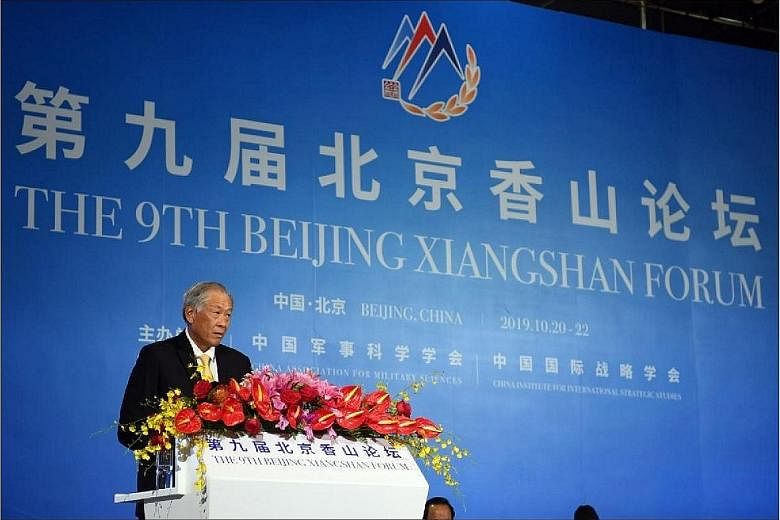The United States and China must find some common ground amid their disagreements, otherwise the increasing polarity would make it harder for small countries like Singapore to keep a neutral position between the two powers.
Defence Minister Ng Eng Hen said yesterday that small states like Singapore are watching the contest play out with great concern.
"Singapore will maintain its strong friendships with both sides. But it is also acutely aware that the further the US and China pull apart, the harder it would be for all countries to keep to this principled and neutral position," added Dr Ng, who was speaking at a plenary session at the Xiangshan Forum, a security summit in Beijing.
The world also needs both countries to work together to ensure progress and stability, and deal with common security challenges like climate change and terrorism, he said, as he questioned the need for the US and China to "decouple".
"Previously, in a unified globalised system, both the US and China provided stability to the whole, each adding value to it, despite the sum of their differences. But now, in attempting to decouple, other countries will be severely impacted as their gravitational forces pull apart," he noted.
Both countries are entangled in a bruising trade war, and incre-asingly see their bilateral rela-tionship as one that is marked by confrontation across different areas, from trade to technology to the military.
Turning to the core positions of both countries, Dr Ng said the US, as the incumbent superpower, wants to address shortcomings and perceived unfairness in the rules and practice of international trade, believing also that other countries "should do more" to protect vested interests in security.
On the other hand, China is looking to preserve the current rules-based multilateral order of the World Trade Organisation that has facilitated its development, among other things, he said.
He added that at face value, both narratives are not in conflict as both countries neither share a land border nor compete for physical resources.
"And yet, the world finds itself in the midst of a strategic rivalry which, for this generation, will be the single most critical issue that determines the fate of our world, countries and citizens at large," he said.
And while almost all countries hope for accommodation between both powers, "they know that their own trade and security positions will have to change to accommodate domestic concerns" of the US and China, he said.
While it is easy to look at the gulf between both countries and despair, Dr Ng pointed to how then US President Richard Nixon kicked off rapprochement with China in 1972, going against what was then "a legacy of 20 years of American foreign policy", quoting former US state secretary Henry Kissinger.
The prevailing thought then was that China would use every opportunity to weaken the US and expel it from China - this had "congealed into established doctrine" by the time Mr Nixon entered the White House in 1969, Dr Kissinger wrote in his book, On China.
Still, the US leader broke with policy and visited Beijing in 1972, where he met Chinese leaders Mao Zedong and Zhou Enlai. The visit was a key step in normalising ties between both countries.
The establishment of diplomatic ties had improved the US-China relationship, said Dr Ng, adding that there are significant parallels with the situation today.
"How can the US and China find that common ground? It will not be easy going but, given that the alternatives are far worse, the US and China must choose to act, as this challenge, at its heart, is a political one," said Dr Ng.
The minister, who is on the last day of a five-day visit to China, was speaking at a plenary session on the interests of small and medium-sized states.
Other defence chiefs who spoke at the session included those from Cambodia, Nepal, Serbia and Rwanda.

